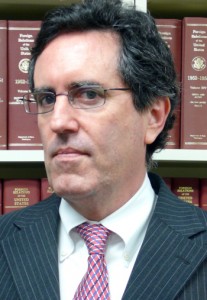
IN 1976, NSA WAS TASKED TO HELP SECURE PRIVATE COMMS
As long ago as the Gerald Ford Administration, the National Security Agency was directed to help secure non-governmental communications networks against intrusion and interception by foreign — or domestic — entities, according to a recently declassified presidential directive.
“The President is concerned about possible damage to the national security and the economy from continuing Soviet intercept of critical non-government communications, including government defense contractors and certain other key institutions in the private sector,” wrote National Security Advisor Gen. Brent Scowcroft in National Security Decision Memorandum (NSDM) 338 of September 1, 1976.
“The President further recognizes that U.S. citizens and institutions should have a reasonable expectation of privacy from foreign or domestic intercept when using the public telephone system. The President has therefore decided that communication security should be extended to government defense contractors dealing in classified or sensitive information at the earliest possible time. He has also directed that planning be undertaken to meet the longer-term need to protect other key institutions in the private sector, and, ultimately, to provide a reasonable expectation of privacy for all users of public telecommunications.”
The directive ordered that “in confirmed threat areas,” existing communications networks involving classified information should be transitioned from microwave circuits to secure cable “as soon as possible.” A broader plan to protect non-governmental communications was also to be prepared.
“The President further directs the Director of the Office of Telecommunications Policy, with the participation and assistance of DOD and NSA, to prepare a detailed Action Plan setting forth the actions and schedule milestones necessary to achieve a wide degree of protection for private sector microwave communications. The Plan should identify needed policy and regulatory decisions, describe in detail the roles of industry and government, including management and funding considerations, and integrate the schedule for these actions with the technical development milestones.”
“The Action Plan should be based on the fundamental objective of protecting the privacy of all users of public telecommunications, as well as satisfying specific needs of the government,” the directive stated.
The 1976 directive was originally marked TOP SECRET / SENSITIVE (XGDS), where XGDS stood for “exempt from general declassification schedule.” It was declassified on September 13, 2011. The document had been requested through the mandatory declassification review process by Dr. John Laprise of Northwestern University.
The directive prefigures an ongoing controversy over the proper role, and the actual extent, of National Security Agency involvement in securing public communications.
In response to a FOIA lawsuit brought by the Electronic Privacy Information Center, the NSA said (and a court affirmed) that it could “neither confirm or deny” a relationship between the Agency and Google. NSA has also refused to release the 2008 National Security Presidential Directive 54, which reportedly tasks the Agency with certain cybersecurity functions.
Phi Beta Iota: This would be an excellent case study for the retrospective court martial, conviction, and demotion by two grades in retirement (affects pension) of every NSA director since then, with special attention to those serving after the alarm was sounded again in 1994. NSA today does not have the public interest in mind and could care less about presidential directives. It exists to create millionaires among NSA senior executives jumping to sweetheart “soft landings.” NSA and the Cyber-Command are an ideal candidate for the first joint GSA-OMB deep audit of secret spending since 2001.








